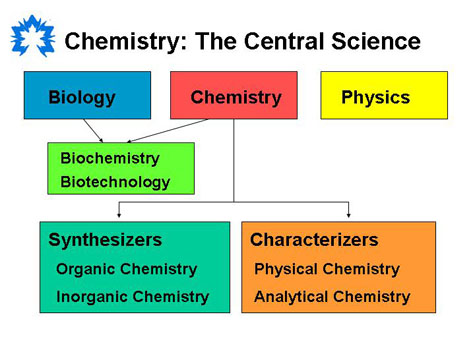FAQ: Undergraduate Chemistry & Biochemistry
This page is designed for students in undergraduate chemistry & biochemistry, as well as for high school students who are thinking about a career in chemistry, biochemistry or related fields. You may want to read this brief description of our programs and department before getting started below.
What is Chemistry and Biochemistry?
Chemistry, which has its origin in the ancient art of alchemy, is the study of matter. Chemists study:
- The structure and properties of the elements of the periodic table
- How elements combine with one another to form molecules
- The elemental composition and molecular structure of different materials
- The rates and manners in which molecules combine and react with one another
Biochemistry is the application of chemistry to the study of biological processes at the molecular level. Biochemists study:
- Cell development, growth, heredity, and disease
- Analyse enzymes, DNA, and other biomolecules
- Study the effects of drugs and food on biological processes
- Elucidate how a biomolecules structure influence its function
Where does chemistry and biochemistry sit in relation to other sciences?
Chemistry is often referred to as the “central science”, since the most competent and inventive chemists have a working (or even more extensive) knowledge of biology, physics and mathematics, in addition to chemistry. Learning chemistry requires the ability to comprehend large amounts of qualitative data, as in biology or earth sciences, as well as dealing with the abstract concepts of physics and mathematics. Unique to chemistry is a highly advanced non-mathematical symbolic language - which all chemists must learn - which conveys information on molecular structure, symmetry and reactions very quickly and clearly. Chemists are very much jacks-of-all-trades, bringing many areas of science and technology into their work.

Chemistry seems like a vast field - is it divided up somehow?
Yes, chemistry is a vast field, it is divided traditionally into a number of sub-disciplines:
- Biochemists concern themselves with the chemistry of life, including the chemistry of proteins, DNA, RNA and enzymes. They synthesize new biological molecules, and study the way in which "biomolecules" function within the bodies of living organisms, including human beings!
- Organic chemists study compounds containing carbon and protons. Atoms of this element can form stable chains and rings, and a multitude of fascinating molecules containing other elements, giving rise to very large numbers of natural and synthetic compounds.
- Inorganic chemists are interested elements across the periodic table, notably the main group metal and transition metal elements. Organometallic chemists (organometallic chemistry is the largest sub-discipline of inorganic chemistry) work on inorganic complexes that have bonds between metal atoms and carbon atoms.
- Physical chemists study the structures of materials, and rates and energies of chemical reactions. Spectroscopists and theoretical chemists represent two large sub-groups of physical chemists. Spectroscopists study the interaction of light and matter, and provide information on the structures of molecules that synthetic chemists have created. Theoretical chemists use mathematics and computational techniques to derive unifying concepts which explain chemical behaviour.
- Analytical chemists develop test procedures to determine the identity, composition and purity of chemicals and materials. Many analytical procedures often discover the presence of previously unknown compounds.
- All chemists and biochemists are trained to have a bit of experience in all of these subdisciplines, with a strong specialization in one or more of these areas!
New and important specialty areas in chemistry: Analytical, organic and physical chemists, along with biochemists are exceptionally important in the areas of environmental science and forensic science - in fact, most people working in these areas are environmental chemists, forensic chemists and molecular biologists.
What sort of problems do chemists work on? What sort of questions do they ask?
Chemists study the nature and characteristics of substances and the changes they undergo when they are mixed one with another, and utilize this information to prepare new substances of value to society. Chemistry is involved in some way with almost everything we do or use. Chemists are employed in industries and companies which provide us with food, energy, consumer goods, in regulatory bodies that protect our health, environment and general well-being and in research institutions that create futuristic materials and help to solve a variety of chemical problems.
Chemistry asks questions such as:
- Are there contaminants in food products that make it unfit for human consumption?
- What are the natural concentrations of heavy metals in ground water?
- How is a new industrial process likely to affect the environment?
- How can we design an efficient and useful fuel cell?
- What are the structures of the molecules that give rise to phenomena such as superconductivity?
- Can we use small molecules as building blocks to assemble tiny molecular machines that can perform tasks such as drug delivery?
- What types of materials can be made to make stronger, lighter metals for aircraft?
- Can we design catalysts that improve the production of plastics?
- Can we synthesize environmentally safe and/or biodegradable plastics and coatings?
- How can we make industrial chemicals from oil and natural gas?
- How can we make pharmaceuticals, vitamins or other important biological chemicals?
- How do pharmaceuticals, enzymes and vitamins work in the body?
- How do animals and plants protect themselves from predators?
- What are the key chemical reactions that allowed life to evolve?
- Can we us the chemical signals produced by all living things to control pests?
- How can we tell what is happening inside a blast furnace, or in the exhaust of a jet engine, or down a coal mine?
- Can we synthesize chemicals which can be used in the production of blue light emitting diodes?
Back to Undergraduates | Back to FAQ page | Back to Top
Report broken links to chembiohead@uwindsor.ca
